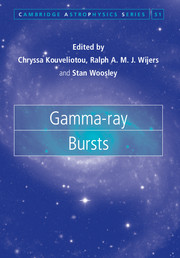Book contents
- Frontmatter
- Contents
- List of contributors
- Prologue
- 1 The discovery of the gamma-ray burst phenomenon
- 2 Instrumental principles
- 3 The BATSE era
- 4 The cosmological era
- 5 The Swift era
- 6 Discoveries enabled by multiwavelength afterglow observations of gamma-ray bursts
- 7 Prompt emission from gamma-ray bursts
- 8 Basic gamma-ray burst afterglows
- 9 The GRB–supernova connection
- 10 Models for gamma-ray burst progenitors and central engines
- 11 Jets and gamma-ray burst unification schemes
- 12 High-energy cosmic rays and neutrinos
- 13 Long gamma-ray burst host galaxies and their environments
- 14 Gamma-ray burst cosmology
- 15 Epilogue
- Indix
- Plate section
- References
14 - Gamma-ray burst cosmology
Published online by Cambridge University Press: 05 December 2012
- Frontmatter
- Contents
- List of contributors
- Prologue
- 1 The discovery of the gamma-ray burst phenomenon
- 2 Instrumental principles
- 3 The BATSE era
- 4 The cosmological era
- 5 The Swift era
- 6 Discoveries enabled by multiwavelength afterglow observations of gamma-ray bursts
- 7 Prompt emission from gamma-ray bursts
- 8 Basic gamma-ray burst afterglows
- 9 The GRB–supernova connection
- 10 Models for gamma-ray burst progenitors and central engines
- 11 Jets and gamma-ray burst unification schemes
- 12 High-energy cosmic rays and neutrinos
- 13 Long gamma-ray burst host galaxies and their environments
- 14 Gamma-ray burst cosmology
- 15 Epilogue
- Indix
- Plate section
- References
Summary
Introduction
One of the important goals in modern cosmology is to understand how the first stars formed at the end of the cosmic dark ages, and how they transformed the initially simple, homogeneous Universe into a state of ever-increasing complexity (e.g., Barkana & Loeb 2001, Miralda-Escudé 2003, Bromm & Larson 2004, Ciardi & Ferrara 2005, Loeb 2006, Bromm et al. 2009). The first stars (so-called Population III [Pop III]) are predicted, based on results from numerical simulations, to have started forming at redshifts z> 20, and to have been predominantly very massive with M* > 100 M☉ (e.g., Bromm et al. 1999, 2002, Abel et al. 2000, 2002, Nakamura & Umemura 2001, Bromm & Loeb 2004, Yoshida et al. 2006, Gao et al. 2007, O'Shea & Norman 2007). They had likely played a crucial role in driving early cosmic evolution by producing ionizing photons and heavy elements. The initial stages in the reionization of the intergalactic medium (IGM) have recently been investigated in great detail with one- and three-dimensional simulations, showing the expansion of individual HII regions around the first stars (Kitayama et al. 2004, Whalen et al. 2004, Alvarez et al. 2006, Johnson et al. 2007). In addition, the first stars were responsible for the initial metal enrichment of the IGM, because the first supernova (SN) explosions rapidly dispersed the heavy elements that were produced during the short (several Myr) lifetime of Pop III stars into the environment.
- Type
- Chapter
- Information
- Gamma-ray Bursts , pp. 291 - 310Publisher: Cambridge University PressPrint publication year: 2012
References
- 1
- Cited by

